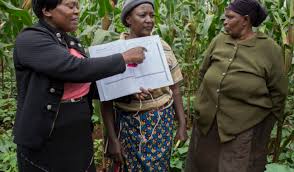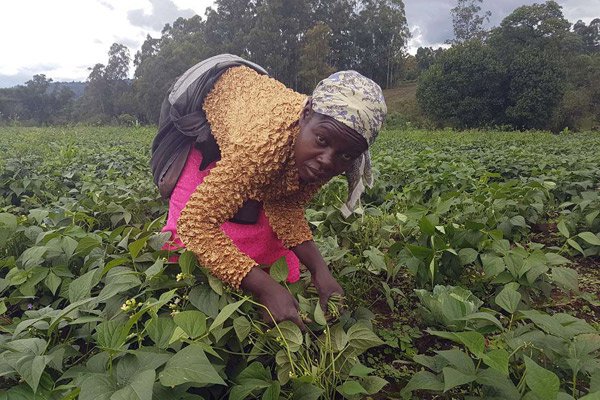It is not farming as usual for more than 4,000 farmers in Kiambu County on the outskirts of Kenya’s capital, Nairobi. The farmers have embraced the use of high yielding maize varieties, use of fertilizer and correct seed spacing which has doubled their yields.
This is thanks to an innovative approach of using Village Based Advisors (VBAs) to empower smallholder farmers achieve food security.
The approach, according to Dr. Jane Ininda – Associate Program Director at the Alliance for a Green Revolution in Africa (AGRA), assists farmers in gaining access to the appropriate maize varieties and information on best farming practices.
Beatrice Ndichu, for example, has been a farmer for the last 30 years. She says she could only harvest four bags of maize from her one acre farm. “The maize was only enough to feed my family,” said Ndichu.
RELATED ARTICLE: AGRA scales food security resolve with new programme
She admits to not having any skills on the correct spacing of seeds and that she would plant four seeds in one hole. For her, farming was just a routine she practiced the way she was taught by her parents.
But since she got trained on the right way to farm, the mother of five has recorded a significant uptake in her fortunes.
“I used to plant about four seeds in one hole but since I was trained by AGRA through VBAs. I space the seeds one foot apart and diligently and correctly apply fertilizer. The results are evident for all to see. My yields have increased significantly,” says Ndichu.
Anne Koimburi, Director of Crops and Irrigation in Kiambu County Government said that for the county and country to achieve food security, farmers need to change their mindsets and get trained on good agronomic practices.
Koimburi said farmers need to realize that it is not the size of land that matters but they only need to maximize the space they have.
“Productivity is the key issue. From every hole in maize planting, you need to know the plant population and how much you are going to get from that maize plant,” she said.
The officer said the approach of correct seed spacing, use of fertilizer and best management can ensure farmer maximize on productivity even with less acreage under production.
“Most farmers have been getting about four bags per acre but with good seed variety and good husbandry practices, one can get 15 to 20 bags per acre,” added Koimburi.
RELATED ARTICLE: Village banks provide cheap financing for rural farmers

Village based advisors
Damaris Kinyanjui, is a village based advisor and she said that so far she has trained close to 100 farmers. “Last season, I sold about 300 packets of improved maize varieties and I am hoping to sell 1,000 packets during the upcoming short rains season,” she said. She is one of the 45 self-employed VBAs working in the county.
According to Kinyanjui, changing the farmers’ mindset has been a challenge, but this has changed through the ‘seeing-is-believing’ way, where they see the changes in their neighbours’ farms.
“I train them on the good varieties to plant and also sell it to them and the happy farmers who have seen the transformation in terms of their yields, have even christened the maize varieties, ‘dama’, short for Damaris,” she said.
The VBAs have been trained in partnership with seed and fertilizer companies on how to teach farmers on the use of the appropriate maize varieties, correct spacing of seed, placement of fertilizer and other good agricultural practices including control of the Fall Armyworm.
This approach has been developed by AGRA in partnership with the Kiambu County Government, the Agricultural Market Development Trust (AGMARK), Farm Input Promotions Africa Limited (FIPS-Africa) and private sector seed and fertilizers companies to achieve agricultural transformation.
RELATED ARTICLE: Village libraries quench farmer thirst for information in Vihiga
Feeding a growing population
James Nyoro, Deputy Governor Kiambu County, said that the growing population intensifies the need to ensure that people from Kiambu are food secure, and can also produce surplus food to feed surrounding areas of Nairobi.
“We are realizing that over the last fifteen years, research organizations have produced over 200 varieties which farmers are adopting yet there in no increase in productivity. Our analysis indicates that most of the farmers are not buying seeds appropriate for their ecological conditions. To address this, we are working with AGRA, seed and fertilizer companies and other partners to connect the seed companies with the VBAs that popularize the correct varieties within their villages,” he said.
He said the approach ensures farmers have the appropriate variety at the right time before the rains and also have sound technical advice because; “It is like having the right medicine and you don’t know how to take it.”
Nyoro, who is former advisor to the Kenya President on food security, said they are planning to scale this model up to other parts of the county in collaboration with AGRA.
“We will soon be having a meeting with all the seeds companies to ensure that the seeds and the fertilizers are available to the farmers by September this year in time for the upcoming rainy season.”
Write comment (0 Comments)
















